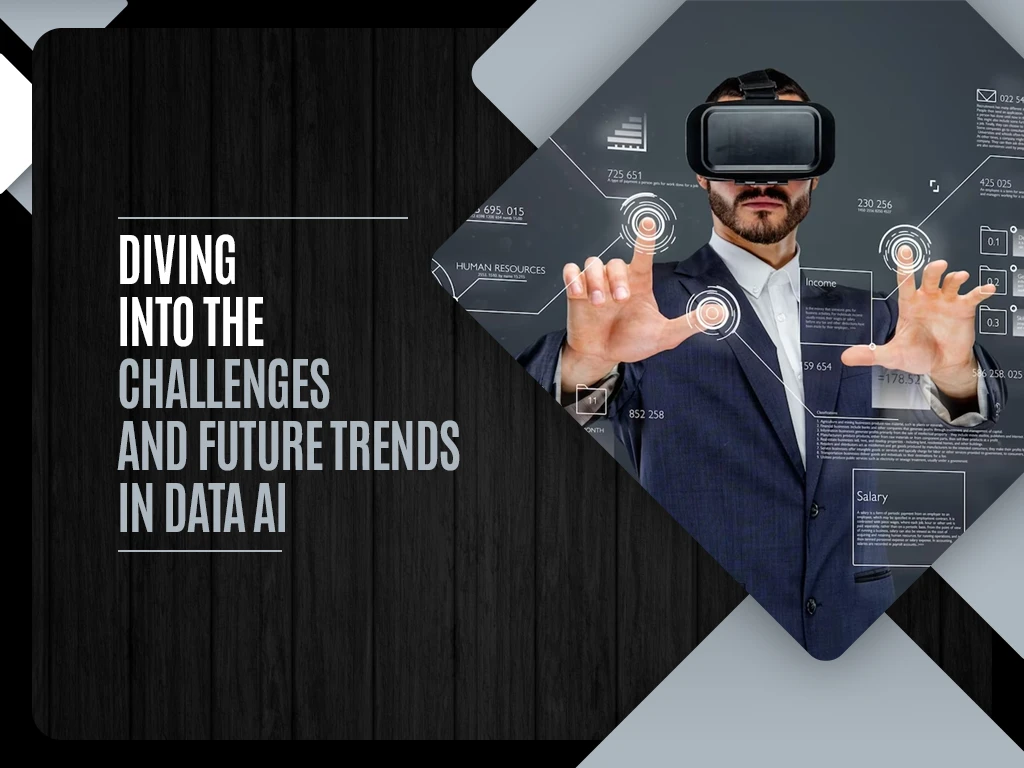Diving into the challenges and future trends in Data AI

Data AI – the ubiquitous term echoing across conferences and boardrooms – isn’t merely a fleeting fad. It’s the transformative force reshaping industries, anticipating our desires, and even crafting symphonies that stir the soul. Yet, beneath the dazzling veneer of progress lurk Challenges and Future Trends in Data AI, a complex tapestry woven with intricate roadblocks and ethical quandaries. To navigate this labyrinth, we must delve deeper than the surface, confronting the hurdles that impede responsible AI development and illuminating the paths leading to a future where technology serves humanity.
Data AI: Grappling with Challenges
The allure of Data AI is undeniable. It promises to revolutionize industries, personalize experiences, and unlock unprecedented insights. Yet, beneath this blossoming garden of possibilities lie hidden thorns – challenges that threaten to stunt its growth and impede its ethical development.
Let’s delve into these complexities, examining the roadblocks that stand in the way of realizing Data AI’s true potential.
The Explainability Enigma:
Imagine a black box churning out decisions that impact your life – loan approvals, healthcare diagnoses, even legal judgments. This opaque reality is at the heart of many Data AI models. We entrust them with critical tasks, but how can we trust their decisions if we don’t understand the reasoning behind them?
Explainable AI (XAI) emerges as the key to unlocking this enigma. We need models that not only deliver results but also reveal their inner workings, fostering trust, accountability, and preventing bias.
The Ethical Minefield:
Data AI is a double-edged sword, capable of both empowering and endangering. While it personalizes medicine and optimizes resource allocation, it also carries the risk of exacerbating social inequalities and infringing upon privacy. Biases embedded in training data can lead to discriminatory algorithms, perpetuating existing societal fractures. Imagine a facial recognition system disproportionately misidentifying minorities, or a hiring algorithm favoring certain demographics.
These scenarios are not mere hypotheticals; they are stark realities waiting to unfold if we fail to address ethical considerations. We need robust bias detection and mitigation techniques, coupled with clear ethical frameworks that guide the development and deployment of Data AI.
The Data Scarcity Dilemma:
Data fuels the engine of Data AI, yet its availability often falls short of our ambitions. Limited access, privacy concerns, and fragmented datasets pose significant hurdles. Imagine building an AI model to predict climate change without access to relevant data from diverse sources.
This scarcity impedes progress and hinders the development of truly impactful solutions. We need innovative approaches to data sharing and privacy protection, fostering collaboration and unlocking the full potential of data-driven insights.
The Talent Gap:
The language of Data AI is complex, demanding specialized skills and expertise. From data scientists to AI engineers, the demand for talent far outstrips the supply. This gap creates bottlenecks and impedes the widespread adoption of Data AI solutions. Bridging this gap requires concerted efforts to invest in education and training, fostering a new generation of AI-savvy professionals.
The Accountability Vacuum:
As AI systems become increasingly sophisticated, the question of accountability arises. Who is responsible for the decisions they make? The programmer, the data scientist, the algorithm itself? This ambiguity creates a dangerous vacuum, potentially shielding harmful decisions from scrutiny and accountability. There’s a need for clear legal frameworks and robust oversight mechanisms to ensure responsible development and deployment of Data AI, ensuring that technology serves humanity, not the other way around.
These challenges, though daunting, are not insurmountable. By addressing them head-on, we can nurture the garden of Data AI, ensuring its fruits benefit all of humanity. The path forward requires collaboration, innovation, and an unwavering commitment to ethical principles. Only then can we unlock the true potential of Data AI, shaping a future where technology empowers, not exploits, the human spirit.
Future Trends: A Glimpse Through the Looking Glass
The future of Data AI isn’t a singular path, but a dazzling kaleidoscope of possibilities brimming with transformative potential. Here are just a few trends that beckon on the horizon:
- Explainable AI (XAI):
Imagine peering into the black box of AI models, understanding their reasoning and decision-making processes. XAI techniques like interpretable models and counterfactual reasoning will shed light on AI’s inner workings, fostering trust, collaboration, and eliminating discriminatory biases.
- Federated Learning:
Data privacy concerns shouldn’t impede the march of progress. Federated learning offers a promising solution, allowing AI models to learn from vast datasets across diverse locations without compromising individual privacy. Imagine a global network of devices collaborating to train AI models for disease prediction, all while keeping local data secure.
- Human-AI Collaboration:
The future isn’t about humans vs. machines, but humans with machines. Imagine surgeons equipped with AI-powered insights during surgery, or architects co-creating with AI to design sustainable buildings. Seamless human-AI partnerships will leverage the strengths of both, amplifying creativity, problem-solving, and decision-making capabilities.
These are just a glimpse through the kaleidoscope of Data AI’s future. As we navigate the challenges and embrace its potential, we stand poised to unlock a new era of human-machine collaboration, one that promises to reshape industries, advance scientific understanding, and improve the lives of people around the world.
The Road Ahead
The journey towards responsible and ethical Data AI is paved with challenges. But by embracing explainability, addressing ethical concerns, and collaborating with diverse stakeholders, we can navigate the labyrinth and unlock a future where Data AI empowers, not exploits, humanity. Remember, the true power of Data AI lies not in its algorithms, but in our ability to harness its potential for good.

